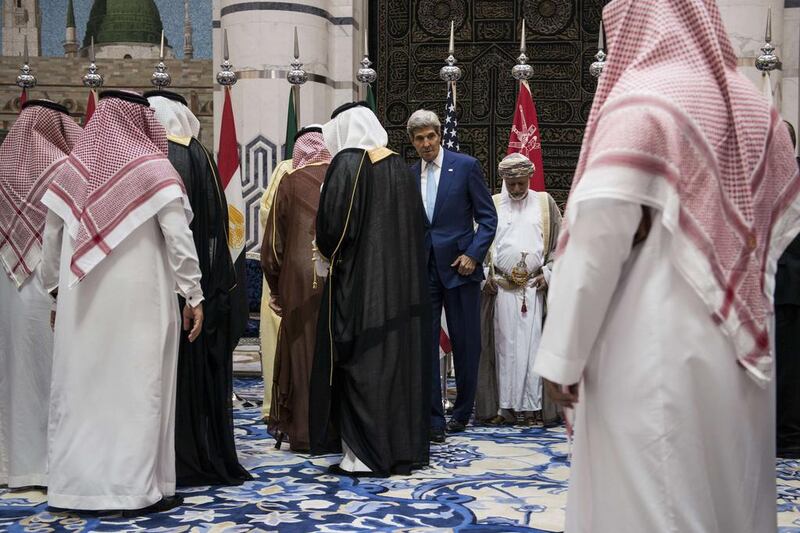JEDDAH // The UAE and nine other Arab countries agreed on Thursday to rally behind Washington in the fight against ISIL.
In addition to the Emirates, Saudi Arabia, Bahrain, Egypt, Iraq, Jordan, Kuwait, Lebanon, Qatar and Oman pledged to do their part to help the US defeat the extremists.
“The participating states agreed to do their share in the comprehensive fight” against ISIL, said a statement at the conclusion of a meeting between US secretary of state John Kerry and Arab foreign ministers.
The countries declared their “shared commitment to stand united against the threat posed by all terrorism, including the so-called Islamic State in Iraq and the Levant”.
Participation in the fight will include “as appropriate, joining in the many aspects of a coordinated military campaign against ISIL”.
The fight will include “stopping the flow of foreign fighters through neighbouring countries, countering financing of ISIL and other violent extremists, repudiating their hateful ideology, ending impunity and bringing perpetrators to justice”.
It will also include “contributing to humanitarian relief efforts, assisting with the reconstruction and rehabilitation of communities brutalised by ISIL, supporting states that face the most acute ISIL threat”.
They also agreed to boost support for the new Iraqi government as it tries to unite its citizens in the fight against the militants, and discussed strategies to “destroy” the group “wherever it is, including in both Iraq and Syria”.
Turkey also attended the meeting but did not sign the final communique.
Mr Kerry said after the meeting that
Kerry told reporters that Arab partners would play a “leading role” in the the fight against ISIL.
“As I understand ... from the meeting we had today, Arab nations play a critical role in that coalition, a leading role,” he said.
Greater regional support is seen as key to combating the spread of the group, which has proved so ruthless that even Al Qaeda severed ties with it this year.
Nearly 40 nations have agreed to contribute to what Mr Kerry predicted will be a worldwide fight to defeat the group.
Barack Obama on Wednesday laid out a long-term US strategy against the group that would include expanding airstrikes against its fighters in Iraq, launching strikes against them in Syria for the first time and bolstering the Iraqi military and moderate Syrian rebels to allow them to reclaim territory from the militants.
Riyadh is likely to play a major role in the effort after it agreed to open its military bases for the training of moderate Syrian rebel forces to better equip them against the threat of ISIL, a US official said.
Mr Obama was also able to rally support at home from his fellow Democrats and Republicans in Congress, from whom he has called for new authority to combat ISIL.
“We ought to give the president what he’s asking for,” said House speaker John Boehner, the top Republican in Congress.
In the frequently-gridlocked senate, both party’s leaders predicted legislators would swing behind the president’s request. “Not the least of which is the authority to equip and train Syrian troops to fight these ... evil terrorists,” said majority leader Harry Reid.
His Republican counterpart, Mitch McConnell, said: “Over the next week, following a series of briefings, Congress will work with the administration to ensure that our forces have the resources they need to carry out these missions.”
Meanwhile, Mr Kerry continues his mission of building up the anti-ISIL coalition with a visit to Turkey, a fellow Nato member, on Friday.
The only Muslim member of the core 10-nation coalition against ISIL that was forged at the Nato summit in Wales last week, Turkey will refuse to take part in combat operations against the militants or to allow its air bases to attack the militants in neighbouring Iraq and Syria, according to a government official.
“Turkey will not be involved in any armed operation but will entirely concentrate on humanitarian operations,” the official said ahead of Mr Kerry visit.
And Incirlik, a southern air base used for Nato operations in Iraq, “will be used only for logistical purposes and humanitarian assistance”, the official said.
A US official in Jeddah on Thursday said Turkey had its reasons for staying out of the coalition.
“We understand the challenging situation Turkey is in given their detained diplomats and they will make the decision on what role they can play moving forward.”
ISIL militants hold 49 Turks hostage, including diplomats and children, abducted from the Turkish consulate in Mosul in Iraq in June.
Mr Kerry is expected hold talks with president Recep Tayyip Erdogan and prime minister Ahmet Davutoglu in Ankara before travelling to Egypt on Saturday.
In Cairo, he will meet the Arab League chief Nabil Al Arabi “to brief the secretary general on the results of the Jeddah conference”, a senior league official said.
* With reporting by Agence France-Presse, Associated Press and Reuters





